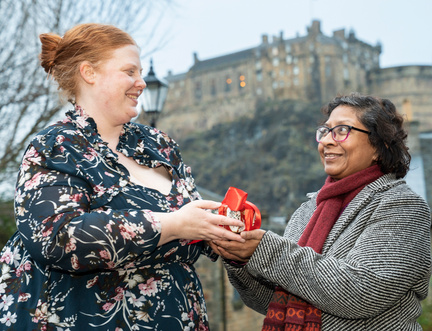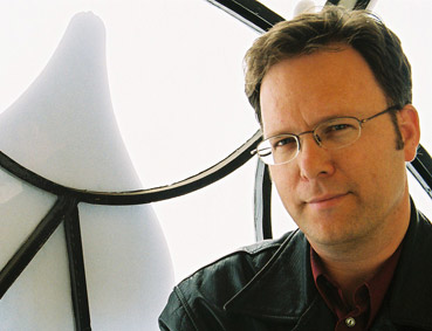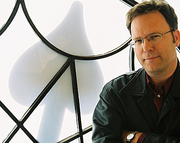The Big Question
By Garth Nix
We have commissioned a new piece of writing from fifty leading authors on the theme of 'Elsewhere' - read on for Garth Nix's contribution.
A long time ago, as people measure time, but not so long that the stars have changed in the heavens or the rocks have turned to dust, a young man left his home to go hunting on the mountain that loomed above his village. He took two spears and a knife with him. One spear was short, for throwing, and that was his hunting spear. The other was long, and that was his fighting spear, should he meet any enemies, even though no one from his village had ever met or seen any enemies. The young man had never seen any strangers at all, and had heard only legends of outsiders who long ago had somehow managed to climb up to his home, a very high and secret valley, which lay nestled between three mountains.
Two of the mountains were permanently covered in snow and ice. The third mountain was smaller, and a forest grew from the valley floor almost to the icy pinnacle that stood in the shadow of its much taller companions. The forest was full of animals to hunt and be taken home to fill the pot.
As the young man — who was called Avel by his family — skinned his catch, he found himself looking out from the mountainside to the permanent carpet of clouds that shrouded the world beyond and below, and he wondered what lay beneath those clouds. Were there other animals he might hunt, and were there other people? Did they hunt deer, and eat venison, and raise corn?
That night he asked his mother, who was the wisest person he knew, what the world was like outside their valley.
“I do not know, Avel,” she replied. She thought for a while longer, then added, “When I was a girl, there was a wise woman . . . or perhaps a wise man with a womanish voice . . . who lived in a cave near the big waterfall. My mother told me that this wise woman knew about the world beyond. I have not thought of her in years, or heard if she still lives. Perhaps if you go there you will learn the answer to your question.”
Avel nodded. The big waterfall was four days’ walk away, at the foot of the valley. It was a long way to go to get the answer to an idle thought.
“It is not an important question,” he said, and hugged her.
But Avel could not forget his question. Every time he went hunting, and looked out from the upper slopes to the cloud-shrouded lands below, he wondered what was out there. Finally, he decided that he would go and talk to the wise woman who lived by the big waterfall, and ask her his question.
He left just after dawn the next day, bidding farewell to his mother, his brothers and sisters, as they prepared for the day’s work: weeding in the corn field, fishing in the river and, for the next-oldest brother, taking over Avel’s hunting grounds for a while.
Other villagers waved or called out to him as he strode down the terraced hill below his house. Avel was well-liked, for he was an amiable young man, and a good hunter who readily shared his kills when he had more than enough meat for his family’s needs.
Avel reached the waterfall three days later, after an easy downhill journey with occasional stops to hunt or gather food. He had dined well on rabbits, berries and roots, and had even enjoyed his solitary nights, without the press of his family and all their noise around him.
The waterfall marked the boundary of Avel’s world. The river spread wide as it approached the mighty cliff-face of the mountain, before plunging over it, down into the clouded lands beneath.
The cave his mother had told him about was under the cliff-face, on the very edge of the waterfall. Avel saw where it was easily enough, looking along the line of the cliff. But the path down to the cave followed a very narrow, very steep and very slippery ledge. It would be easy to fall, and if he did, there would be nothing but cloud beneath him.
Nevertheless, Avel followed the path down, careful to keep a handhold on the cliff-face at all times. He managed to get to the cave without incident, arriving just as the sun began to shine directly against the cliff.
Avel cautiously went inside the cave and leaned his two spears against the wall, as was polite. It was dry inside, and the floor was covered in rushes that were no more than a week old. Avel smelled smoke, and as he went further in, he saw a fire burning on a raised platform, with most of the smoke going up through a hole in the ceiling.
Next to the fire, lying on a bed of rabbit skins, was a very, very old woman. Her long white hair trailed down from the bed, and her gnarled, crooked hands were folded on her chest. Her eyes were shut, and Avel could not tell if she was dead or alive.
“Hello!” called Avel, but the woman did not reply. Avel took a few steps forward, very slowly. He was remembering stories of ghosts and spirits, and there was not enough sun or firelight to banish the shadows in the cave. Not all the shadows looked as if they belonged there, and they did not move as they should when the fire flickered or the sunshine paled for a moment.
One of the woman’s hands suddenly moved. Avel jumped, his heart pounding. Still she did not speak, but she indicated for him to come forward. Avel obeyed, though he wanted to turn around and run.
“I knew you would come. Take my place, with my blessing.”
She raised her hand again, there was a rattle in her breath, and then her eyes dulled, and one eyelid drooped half-shut.
The wise woman of the waterfall was dead, before Avel could even ask his question.
Avel looked at the shadows. They seemed to him to be clustering closer, and he didn’t know what to do. The old woman had said “take my place”, but he was not wise, he knew nothing beyond the everyday things that everyone knew. She must have thought he was someone else. The very old often saw things no one else saw.
The best thing to do would be to leave her here, he thought, and tell everyone what had happened. In time, someone wise would come to live in the cave, and Avel could ask his question then.
Avel left the cave. But he was too eager, too frightened by the shadows he felt were following at his heels, and as he stepped out on the wet ledge his sandal slipped. The hide strap around his ankle snapped. Avel spun halfway around, his fingers grasping at air instead of the cliff-face.
With a despairing cry, he fell into the waterfall.
For what felt like an interminable time but in fact could only have been a moment, he struggled to get a breath out of the all-encompassing water, and he flailed his legs and arms, hoping against hope that he might grab something to stop his fall. Through it all he felt a more intense fear than any fear he had felt before, a fear that was soon replaced, mercifully, by unconsciousness, as he failed to get his breath, and failed to grab hold of anything.
He went into that darkness knowing that it must be his death. So when he found himself waking, and his breath coming into his mouth, he was bewildered. Surely ghosts did not breathe?
When he opened his eyes, soft light fell upon his face, and he wasn’t in the waterfall, or even in a river. He was wrapped in furs, and there were people nearby with their backs to him. Slowly, every muscle aching, he sat up. One of the people — a man about his own age — turned around and said something to him, but it was gibberish, the words all sounding the same.
“I am Avel,” said Avel, before he passed out again.
The next time he awoke, Avel found himself on the back of a cart drawn by oxen. This was strange, for his people had neither carts nor oxen, but it was not the strangest thing. When he tried to sit up, he found heavy manacles of a reddish metal around his ankles, joined together by a chain of the same material. Later, Avel would come to learn that this metal was bronze, and that he was a slave. His rescuers had not dragged his senseless and waterlogged body from the river out of kindness, but because they thought that he might be a saleable commodity.
It was from the back of that cart that Avel had his last glimpse of the waterfall. It stretched up into the clouds, looking impossibly high. Later, when he had learned enough of the language of his captors to tell his tale, they would not believe he had fallen all the way down the waterfall. As far as they were concerned, the gods lived above the clouds. Avel was a liar and had simply fallen in the river, probably while trying to escape from one of the lowland villages where he was already a slave.
Slaving was not the primary trade of the group that had taken Avel: they dealt in many different things, travelling between the villages of the lush lowlands all the way down to the great city where the river emptied into the sea. It was in this city that they sold Avel, and he became the slave of a merchant whose name was Sernam, though of course to Avel he was always simply “Master”.
For more than ten years Avel travelled as part of Sernam’s household. They went across seas, through deserts and over mountains, travelling from city to city. Avel learned five languages, three alphabets and two systems of counting and arithmetic. He fell in love with a fellow slave, Hebela, and was heartbroken when she was sold and taken away by her new owner.
In the eleventh year of his slavery, Sernam’s ship was wrecked upon an unfamiliar shore. Only Avel survived, for he was the only one who knew how to swim, and even then, it was pure luck that the wind and tide conspired together to bring him ashore.
Taken in by more hospitable people than on his first near-drowning, Avel once more became a hunter in a mountain forest, a provider of meat to a village both like and unlike the one of his birth. The people had different-coloured eyes and skin, and spoke a different language, and lived in houses made of mud bricks rather than timber, but beyond that, they were much the same. Avel fell in love again, with a woman named Kikali, and together they built a new house of bricks, and in time Kikali bore three children, who Avel named after his long-lost brothers and sisters of the village in the high valley.
The children grew, the village prospered, and all was well — until one hot summer day when a caravan slowly shambled in; the mules, as always, went straight to drink at the great stone trough where a spring splashed out cold, fresh water from under the earth. But there was no one leading the mules. The caravan master was unconscious astride one mule, and apart from him, there was only a boy, who was tied across the very last mule and was already dead.
The villagers who helped the caravan master down from the mule died soon after he did, coughing until they could cough no more. After three days, everyone in the village was dead, all save Avel. He had coughed, and sweated, and shouted against invisible enemies, but he had lived.
As was the custom in that village, though it was not his own, Avel carried the bodies to the sacred place on the mountain, and left them for the carrion-eating birds. It took a long time to finish this task, for he was weak from the sickness, and there were so many.
When he was done, he laid himself down with Kikali and his children, and tried to be completely still, so the birds would come and eat him as well. But even though he did not move a muscle, the birds kept circling above, and would not come down.
Eventually, Avel got up. The villagers had believed it was necessary for bodies to be eaten, otherwise they would become unhappy ghosts. Avel did not really believe that, but he wasn’t sure, and he did not want Kikali and the children to linger as ghosts.
He said a farewell in all the languages he knew, and walked away.
A year later, he was a slave again. He had walked to the coast, and taken over an abandoned hut and a hide boat, and become a solitary fisherman, until the day he and his catch were taken by a galley with triple-tiered oars and a ram of green-shrouded bronze.
Avel rowed in the galley for four months. It was hard and thirsty work, for there was never enough fresh water for all the rowers. But it was this need to constantly replenish the ship’s water that helped Avel escape, when the watering party he was with was surprised by raiders while they worked at a beachside stream.
All the galley’s crew and guards were slain, and the slaves were taken to serve their new masters. But Avel spoke the language of the raiders, as he had learned it from his first love, Hebela. So he was thought to be one of their own, and was given weapons and clothing, and joined their band.
Avel did not like his time with the raiders. They roamed the coast, robbing and looting wherever they could, and they also took many slaves, selling them every full moon at a vast slave market on a beach, with the buyers’ ships riding offshore, beyond the breakers.
It was a dark of the moon, a year or more later, when Avel managed to leave the band, sneaking into the night on the back of a stolen horse.
A thousand miles away, the horse was exchanged for a sack of sugar-cured fruits and working passage on a ship and, after a month at sea, Avel came to the city at the end of the river that descended from the great waterfall.
The sack of sugar-cured fruits was valuable in that city, enough for two horses, a cloak, a bronze pickaxe and some travel food. Avel rode the horses in turn, never slackening his pace, following the river back to its source.
He came to the foot of the waterfall late in summer. The river was low, mud extending for many yards from its banks to the central channel. The waterfall, too, seemed less impressive, its mists thinner, and the clouds not quite so high above. But perhaps, thought Avel, it was simply that he had seen so many other waterfalls now.
He had also seen many mountains, and climbed them, in company and alone. He had learned how to find a way among and through rocks, and how to cut hand-holds and foot-holds in ice with a bronze pick.
Even so, the way was hard. There was not one cliff to climb, as he had thought, but many, and here he learned how he had survived his fall so long ago. The waterfall did not plunge straight down from the clouds. There were many waterfalls, and many pools, coming down the mountainside in giant steps.
After days of climbing and backtracking and climbing again, Avel came to the top of the waterfall. He pulled himself up over the last lip of stone, and looked out at the valley of his youth. It was exactly as he remembered it; it seemed nothing had changed. Only four days’ walk away he would find his mother, if she still lived, and his brothers and sisters, and all the folk he had once known so well.
He was keen to go on, but the sun was setting, and the air was already cool. Avel had forgotten how cold it could be, up in the valley, and he was very tired from the climb. He looked again at the way he would go, and then turned about to walk along the edge of the waterfall.
It did not take long to find the path down to the wise woman’s cave. It was wider than he remembered, and there were marks on the stone that suggested someone had worked to make the way easier.
Avel hesitated at the cave entrance. There were two spears against the wall, marking the presence of a visitor. Then he remembered leaving his own spears there, and when he looked, he saw the obsidian points, and recognised the patterns he had chipped himself. They were his spears, still in place after twenty years or more.
He took up his hunting spear but the shaft was rotten and broke in his hands. The fighting spear fared no better. Avel let the broken pieces fall, keeping only the obsidian heads.
There were no fresh rushes on the floor, and the bed of rabbit skins was long gone, and with it the body of the wise woman. But there was a load of dry firewood laid ready on the raised stone, with an obsidian flint and tinder by it, though Avel used his own bronze firewheel for a spark. Then he unrolled his cloak and lay down. For a little while he looked at the obsidian spear-points, turning them every which way against the light. Then he put them by his head, and within moments was asleep.
He awoke soon after dawn, the cave still dark. The sound of cautious, quiet footsteps had brought him from slumber. Avel had learned to sleep lightly among the raiders.
“Careful, grandmother,” whispered a voice by the cave mouth. It was a young man’s voice, speaking in the tongue of Avel’s people, the words sounding strange and familiar at the same time.
Avel sat up. He could see two silhouettes in the cave mouth. One young and straight; the other bent and old, leaning on the first.
“Who comes?” he asked. He was used to speaking in different ways now, and his tongue felt wrong, the shape of his mouth odd and uncomfortable. It made his voice more high-pitched than usual.
“We saw the smoke,” said the young man. “And thought to see if a new wise woman had come to the cave at last.”
“I am not a woman,” answered Avel grumpily, his voice more his own. He stood up slowly and stretched, his muscles and joints aching from the waterfall climb. “Where did you come from? The village is days away.”
“It was,” said the bent silhouette, her voice weak and shaky. She took a few steps forward, old eyes peering eagerly into the dark. “We moved down in the terrible winter, when the river froze.”
Avel stopped his stretching. His heart felt like it might rise up through his chest and come out his mouth, and he could not speak. He knew that voice.
“I have a question,” continued the old, bent woman. “Twenty-two summers ago, my son Avel came to ask the wise woman a question, and he was never seen again. What happened to him?”
Avel opened his mouth, shut it, and opened it again. He thought back across the years — of the joy and the misery, the happiness and the suffering, of Hebela, and Kikali and their children, and of all the people and places he had known.
“He found the answer to his question,” said Avel, as he walked forward, unable to even breathe, and held out his hands. The rising sun peered in just enough to light up his face, and he embraced his mother.
“And then he came home.”
Copyright © 2010, Garth Nix. All rights reserved.
Supported through the Scottish Government’s Edinburgh Festivals Expo Fund.
Look, Listen & Read
- 2025 Festival:
- 9-24 August
Latest News
 Communities Programme participants celebrate success of 2024
Communities Programme participants celebrate success of 2024






